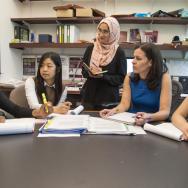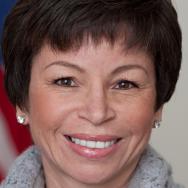Noise and protest are important parts of the #MeToo movement—but so is civility, Valerie Jarrett, a distinguished senior fellow at the University of Chicago Law School and a former senior adviser for President Barack Obama, told students at a Nov. 2 student-run symposium.
“Anger is completely justified because [survivors of sexual assault and harassment] have been violated, and there has been an abuse of power,” Jarrett said during an hourlong conversation with Prof. Emily Buss in a packed lunchtime session. “But tone matters. As we learn when we’re young, it is a lot easier to listen to somebody who isn’t screaming at you. It takes strength to take down the decibel. There is a time for a high decibel, but when you’re really working on an issue with people who are in positions to affect policy—and affect practice and affect culture—then we have to figure out how to have a conversation…that people can hear.”
Storytelling is a powerful way to accomplish that because it builds empathy, she said, adding that gathering to share ideas as real people—not just social media accounts—can be an essential part of finding common ground.
“Technology allows us to hide behind a veil of anonymity,” Jarrett said. “We don’t have to look into the faces of people we say terrible things about, you can just hit and run. That loosens up people’s behavior. When you sit and have a meal together—as we are today—it just changes the tone.”
The Q&A was the keynote session in a University of Chicago Legal Forum symposium, which convened scholars from across the country to examine the way law has shaped the burgeoning #MeToo movement by influencing cultural norms surrounding sexual harassment and assault, informing public discourse and media coverage, and spurring or even limiting reform efforts and institutional change.
“The #MeToo movement is in many ways a cultural reaction to an inadequate legal regime,” said law student Briana Goncalves, the symposium editor and an organizer of the event. “Because the movement has remained so salient in the public discourse, the Legal Forum felt it was necessary to bring the conversation to the training ground for the next generation of advocates and policy makers.”
The one-day conference—the basis for the 2019 Legal Forum, a student journal that publishes a single volume each year on a pressing legal issue—was designed to examine the #MeToo movement through a variety of lenses. The five panels focused on social science research, rhetoric and media coverage, identity and social structures, institutional responses to sexual harassment and assault, and achieving justice for survivors. It drew panelists from nearly a dozen institutions, and Mary Anne Case, the Arnold I. Shure Professor of Law, served as the conference’s faculty adviser.
Scholars brought a variety of perspectives and drew from many disciplines. They engaged in energetic discussions about the media’s use of outdated and overtly sexualized definitions of sexual harassment, a narrowing that scholars argued can minimize stories of the more common, nonsexual gender-based hostility; the benefits and dangers of whisper campaigns and other informal channels of accusation; the unpredictability of revolutionary movements like #MeToo; the need to create a framework that includes the LGBTQ community and people of color in the conversation; the ways in which society’s tolerance for harassment and abuse has changed; the best ways to effect legal, institutional and societal change; and more.
Claudia Flores, a clinical professor and the director of the Law School’s International Human Rights Clinic, talked about innovative approaches to reducing sexual harassment in the workplace. Law, she said, largely relies on the idea that sexual harassment stems from the behavior of wayward employees—the “bad apple” theory—despite studies highlighting workplace culture as a factor in patterns of abuse. She talked about programs that aim at cultural changes within institutions, such as the Fair Food Program, a successful consumer-driven model in which major retailers and restaurant chains agree only to work with farms that agree to certain conditions aimed at protecting female farmworkers from violence and abuse.
Lesley Wexler, a professor at the University of Illinois College of Law, discussed how “law talk” played an important role in the #MeToo movement in both positive and negative ways. Discussions based in legal ideas, she argued, can offer a framework to help guide public discourse—but it can also obscure non-legal conversations and interests, allowing people to become stuck.
“In many parts of the conversation, there’s no compelling reason that the law should be the starting point or even the default,” Wexler said. “If what they want is empathy, to make others feel less alone, to show a living example of survivorship, law talk is both a distraction and may inflict additional harms.”
The conference ended with a panel focused on achieving justice for survivors, including discussions about the high costs that civil and criminal procedures can impose on survivors and an examination of why sexual harassment claims fail.
In her keynote discussion, Jarrett also looked to the future, talking about the need to shift the power balance by supporting policies that encourage more women to seek and remain in leadership positions.
“There’s a role for government, for the private sector—and there’s a role for all of you,” she said to the students.
More broadly, she encouraged them to draw on their University of Chicago education to make change.
“You are coming of age at such an incredible time in our world,” she said. “And our world hungers for your leadership.”
—Article originally appeared on the Law School website.

